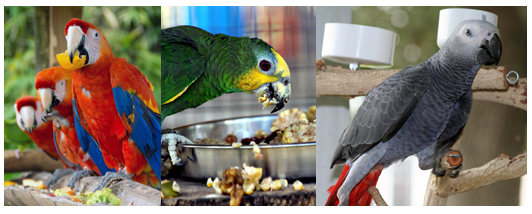

The word Parrot covers such a wide spectrum of birds that covering them in one article is very difficult. All parrots fall under the category of hookbills. Hookbills are generally seed-eating birds that have a hook-shaped bill they use to crack open seeds, nuts, and to tear open fruits. Most parrots are native to tropical area of the world and they range in size from the small African Senegal Parrot to the giant Hyacinth Macaw from South Africa.
Many species mimic well and can be taught to repeat words, phrases and even songs. Some species make “better talkers” than others. Some are more handleable, some are more active, some less so. In addition to generalizations about particular species, individuals within a species may react differently than expected, so there is no guarantee that any one bird will talk.
The information offered here is very general. Before purchasing any bird, carefully research the specific needs of the species you are planning to buy. They all have unique needs and thorough research will ensure the long term health of the bird.
Parrots are generally fed a wide variety of foods, with a seed mix or pelleted food serving as the foundation of the complete diet. Parrot mixes usually contain a mixture of sunflower seeds,safflower seeds, buckwheat, oats, corn, pumpkin seeds and some millet. Often, more exotic blends also contain dehydrated fruit, vegetables, nuts, pasta and a host of other specialty ingredients. Seed based diets can be deficient in vitamin K and D, so the addition of green and yellow fruits and vegetables is often necessary.
Parrots prefer a varied diet, and they can eat almost anything you would eat in small quantities. Their daily diet should be supplemented with plenty of fresh fruits, vegetables, leafy greens, and a selection of treats. There are a few foods that must be avoided, however, including chocolate, avocados, alcohol, and foods high in acidity such as citrus fruits and tomatoes.
Use of an avian daily multivitamin is recommended. These are usually water soluble and can be added to the drinking water or sprinkled over the food. If the vitamins are added to the water, the water container must be thoroughly washed each day.
Fresh water must always be available.
Parrots are housed in various types of cages. Some considerations to keep in mind when purchasing a cage are the size of the cage, the side and quantity of the door openings, the gauge of the wire or bars, and the spacing between them. The cage should be at least large enough for the bird to be able to turn around completely and stretch its wings without touching the wires. The door opening must be large enough for you to reach in and remove the bird if needed. The gauge of the wire must be heavy enough that the bird cant bite through it or break the welds. Also, the wires should be spaced closely enough together that the bird cannot put its head through the openings.
A pull out tray at the bottom of the cage makes for easy cleaning. A wire grate mounted on the bottom of the cage above the tray prevents the bird from digging through the litter.
Most parrots available for sale in the United States are domestically raised and may have been hand fed. A young hand-fed bird makes a much more desirable companion than a bird that was not given the time to form a human bond. Learn how to properly handle your bird daily to keep it tame and affectionate.
Clipping your bird’s wings is recommended to keep them safe and manageable. When done correctly, wing clipping is painless and does not hurt the bird. It’s also not permanent and the clipped feathers will be replaced when the bird molts.
Birds keep their plumage in peak condition by preening. You can encourage this by occasionally misting your bird with warm water. Use a clean spray bottle that has never been used for anything else besides water, and be sure the water is not too warm or too cold.
Parrots can live a very long time, and will often outlive their owners. Purchasing a parrot is a lifetime commitment and the decision to buy one should not be taken lightly. They can be loud, they can occasionally bite, and at certain times of the year (especially during breeding season) their personality can change completely. Your sweet, affectionate pet may turn into an unmanageable monster that wants nothing to do with human companionship until breeding season ends and their hormone levels return to normal. Please do your research and learn everything you can about the particular parrot species you are wanting to buy. If you do, you will be rewarded with life-long companionship as parrots make wonderful, intelligent, and affectionate pets.
© 2025 F.M. Brown's Sons, Inc.